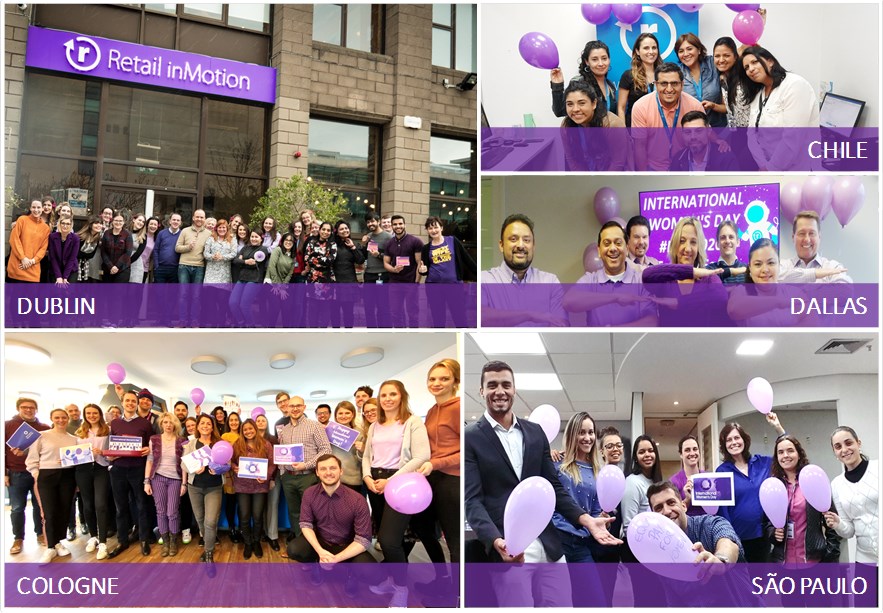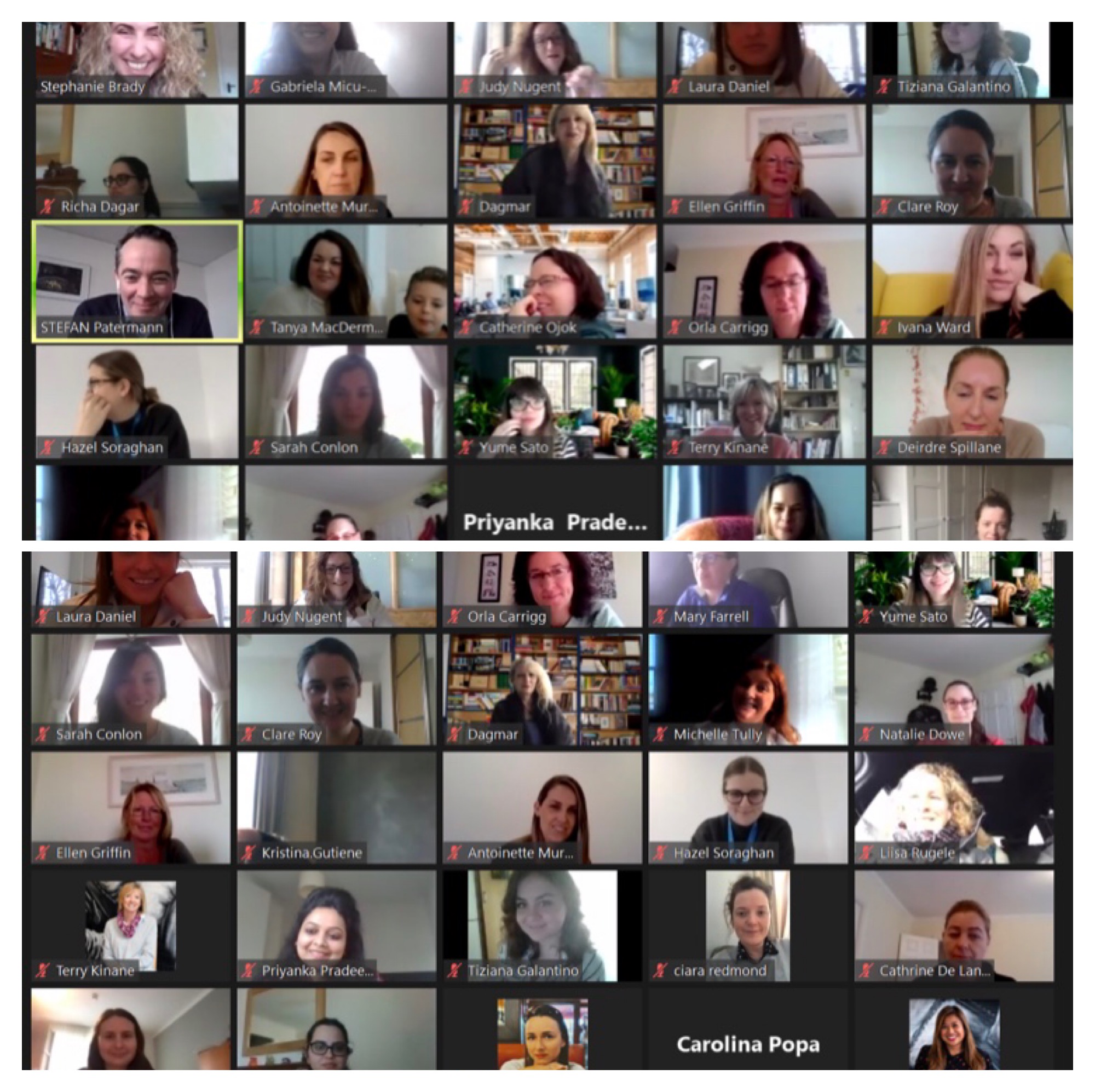Last year, RiMlers around the world celebrated International Women’s Day by wearing purple, the official colour of IWD.

The theme for 2021 is #ChooseToChallenge, which is why we have chosen to put a spotlight on the female leadership, specifically on the women who are shaping the future of our company and industry. Today, we are celebrating their achievements, beliefs, and values.
From challenge comes change, and these women you are going to meet today are shaping diversity and equality within the company. This year also marks a special milestone for Retail inMotion, as our leadership team is becoming more gender-balanced – we currently have four women and seven men in executive positions.
Here, we explore the key principles for a successful career, work values, and leadership styles.
Research by Oxford University’s Saïd Business School has found that happy employees are 13% more productive. I strongly believe that making joy a priority at work will have a positive impact on people’s well-being and productivity.
For me, joy is the most important work value, along with having a great team that supports you and looking at the bigger picture, which helps you understand where you’re heading and gives you a clearer vision of your goals.
Olivia Trenczek
Gender should not be a factor in whether or not a person can be a great leader — a person’s leadership abilities should depend on their individual strengths and personality traits.
In RIM, women are encouraged to take on leadership roles as often as their male counterparts. We are very open to and interested in finding ways to continuously improve our personal skills, which makes us more self-aware, thus enabling us to have very strong emotional intelligence, a key trait of successful leadership.
Michelle Tully
I have learnt invaluable things about myself in my own leadership journey, which have led to an overall more satisfying life. I have learnt what makes me tick, what I bring to the table and what I should avoid and let others do. I have also learnt to use my femininity as a gift rather than a disadvantage.
Another area of fascination (there are many!) is the concept of high performing teams. I do a lot of research and experiments in this area. In a high performing team, you learn to deliver what you do best to the team, support others in bringing their best and play an active part in the psychological safety of that team. Owning who we are is a huge part of being on a high performing team. If I need to pretend to be more masculine to fit in or pretend that I don’t have children I order be available anytime, that’s not a high performing team and never will be.
Stephanie Brady
My teams are my priority and my biggest aim for every team member is to become fully independent (of me), be confident in their own decisions and not be afraid to make mistakes!
Verena Ventsch
Within a young and dynamic company, one tends to use comparison in order to evaluate and position oneself. However, you alone are responsible for how you are perceived and for what you are valued by colleagues and superiors. Use your own assets to achieve your goals, rather than your comparable value.
Be appreciative if you receive constructive feedback, actively request feedback and use any kind of reactions to your actions as a possibility to reflect on what went well and what could have changed the reaction for a better one. Although you may have meant things differently than they have come across, fact is it was perceived differently. Adapt your narrative and course of action to be more effective in getting your message across. You might not always be able to change others, but you can change how you react.
Carolyn Himperich
Some of the guiding principles in my career are integrity, respect, and collaboration. Furthermore, I think it’s important to lead by example and take ownership, treat others the way you want to be treated and give people the tools and autonomy to perform their duties and trust they will.
Orla Carrigg
A great leader listens to their teams and understands the day-to-day intricacies their team may encounter which can later be considered in decision making at that leadership level. It also means when difficult decisions have to be made, the team trusts that the leader believes that things will work out, despite how difficult the road ahead may be. Finally, to be able to create an environment where your team does not fear failure is one to be very proud of, as it is at that place your team will strive and learn their full potential.
Julia Cahalan
We also chose to dive deeper into the ‘qualifications vs. experience’ topic because of the gender qualification gap and stereotypical beliefs. Since the theme of International Women’s Day 2021 celebration is #ChooseToChallenge, we have recommendations that work well in RiM in answer to this conundrum.
Skills, not gender or background, should matter in the hiring process. I’m glad to see that RiM selects people based on skills because skills offer the foundation for success.
Olivia Trenczek
Having experience in my role has won over qualifications. Knowledge is learned along the way and some qualifications would not prepare you for the daily tasks in my role. In saying that I have just finished a college course to support a part of my role I felt I need more knowledge on. A mix of both is a winner. You can’t get experience unless you get an opportunity so both will play a big part in your career.
Michelle Tully
When filling a role or assigning a project, I look for five things
- passion and enthusiasm for the role
- willingness and ability to learn
- strong communication skills
- self-drive/initiative
- common sense.
I value these ahead of relevant prior experience or qualifications.
I have been fortunate to work with many people who thrive and outperform in their jobs despite lack of seemingly necessary qualifications or prior experience. They tick every box on my list of five and learn by doing and by immersing themselves fully to learn as they go. They are a pleasure to work with.
I am surrounded also in my personal life by people who have successfully started again and switched careers one, or many times, in their lives. Lack of relevant qualifications and experience did not deter them. They brought their prior life experience and evident passion for the new work and flourished.
I was also blessed with opportunities to move sideways or upwards into roles which, on paper, I lacked any relevant qualifications or experience for! I was certain however that I could bring fresh perspectives and solutions in these roles, by drawing on prior life and general work experience. I took risks, put myself forward with ideas, and then worked like crazy to deliver when given the chance to do so! I look for that potential and possibility also in others.
Lorna Cullinan
In our field of work, experience and work ethics matter most. What is taught in school/university very rarely reflects the skills we need, it can only be a foundation at best. Years of experience usually teach so much more than a book ever can! However, having common sense and good work ethics is something that can even outweigh experience in my opinion.
Verena Ventsch
Qualifications are very important but if they cannot be applied to the role or environment, then they are not as useful as experience.
Orla Carrigg
It is great to educate yourself academically however true leadership comes from experience and cannot be learned academically. It comes from the difficult situations you find yourself in, the uncomfortable conversations, or the tough decisions you find yourself making. It is at that point is you grow as a leader. At the end of the day, you can have all the qualifications in the world however, if what you are trying to do is not suitable for your business, it will never succeed. You need to keep your pulse on the organisation and talk to the wider teams to really understand the intricacies and areas where improvement can be identified. I really believe feedback is the most important tool any organisation or leader can have and was delighted to see Retail inMotion introducing Pulse Surveys in October of last year.
Julia Cahalan









